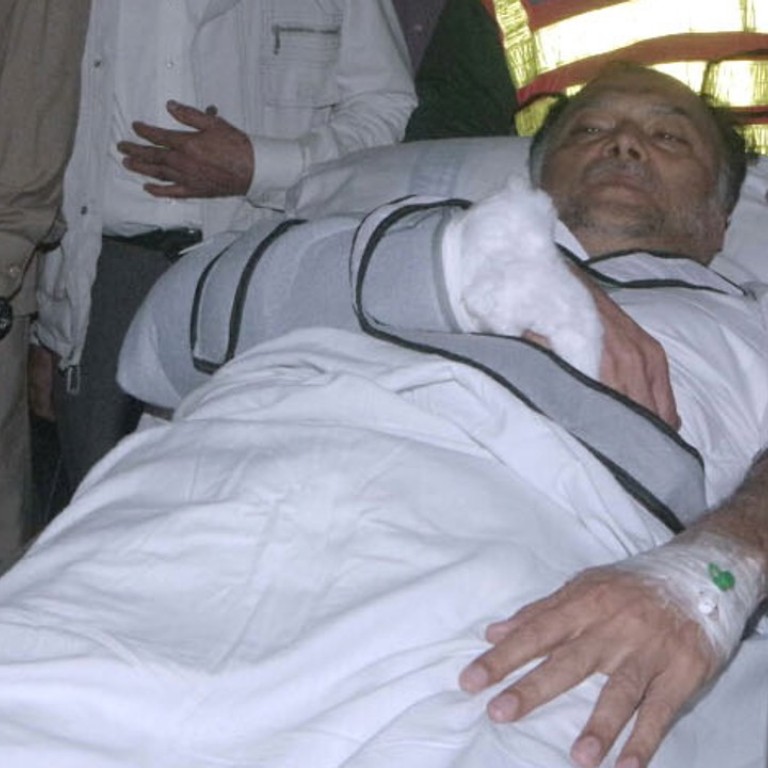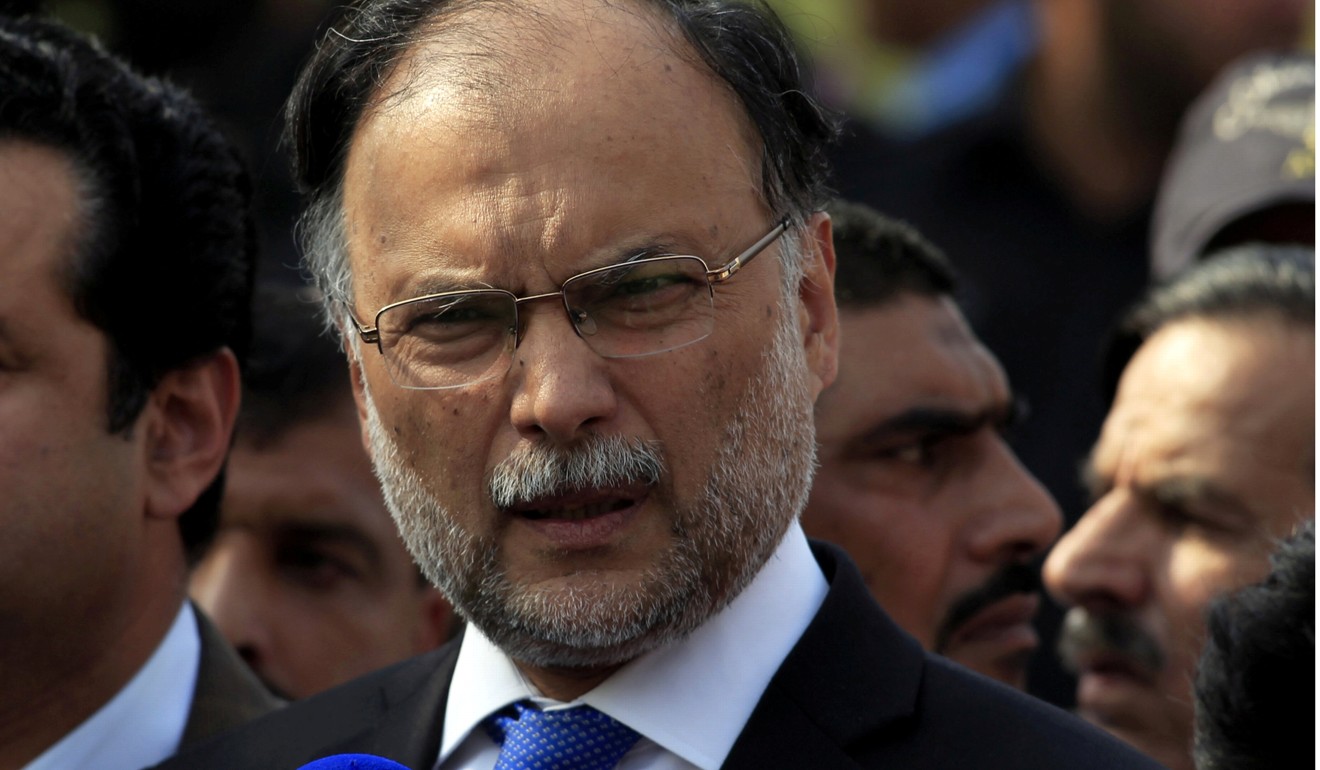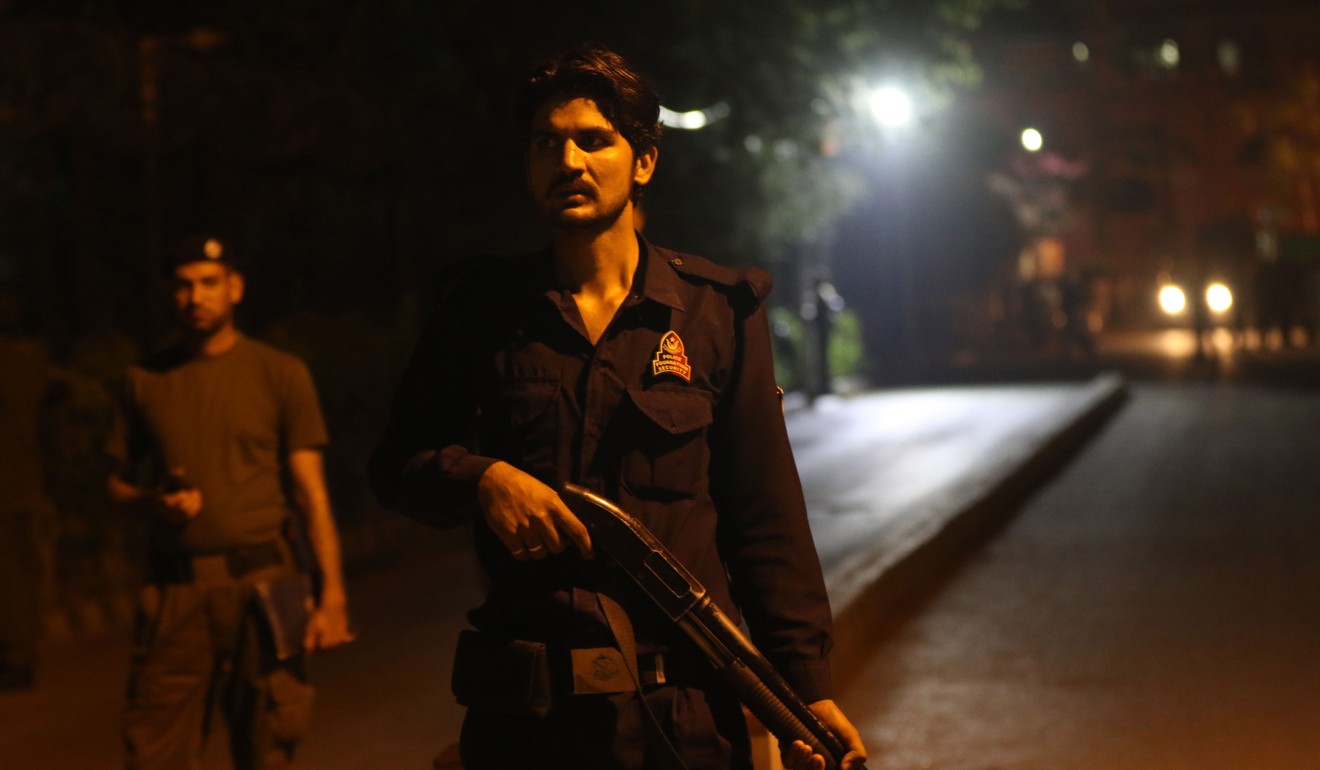
Pakistan minister who oversees Chinese projects recovering after assassination attempt
Pakistani Interior Minister Ahsan Iqbal wounded in an apparent assassination attempt by a gunman linked to a new ultra-religious Muslim party – an incident likely to raise tensions before an election expected in late July
Pakistan’s interior minister was recovering in hospital Monday after being shot in a suspected assassination possibly linked to blasphemy, with the attack seen as a “bad omen” for nationwide elections.
Ahsan Iqbal, 59, was shot in the right arm as he prepared to leave a public meeting in his constituency in Punjab province late Sunday.
A man identified by police only as “Abid” and said to be in his early 20s was wrestled to the ground by police and bystanders as he was preparing to fire a second shot.
He has been taken in to custody.
The party calls for the aggressive enforcement of Pakistan’s blasphemy laws, which can carry the death penalty.
The local deputy commissioner Ali Anan Qamar said that the shooter said he carried out the attack over a small amendment to the oath that election candidates must swear which was hastily reversed last year after it was linked to blasphemy.
The controversy ignited a three-week sit-in last November by a previously little-known Islamist group which paralysed the capital and ended when the government capitulated to the protesters’ demands in a deal brokered by the military.
At the time many Pakistanis warned that a dangerous precedent had been set in which fringe groups could bend the state to their will by citing blasphemy, a highly inflammatory charge in the conservative Muslim country.
EXCLUSIVE :: VIDEO FROM THE SPOT WHEN #AHSANIQBAL GOT HIT.@betterpakistan @siasatpk @pmln_org @PMLNPunjabPk pic.twitter.com/aVK1lodffa— Ali Arif (SAMAA TV) (@i_aliarif) May 6, 2018
Iqbal was rushed first to a local hospital and then airlifted to Lahore, where video footage released by his ruling Pakistan Muslim League-Nawaz (PML-N) showed him being lowered from a helicopter on a stretcher, his eyes open as he responded to questions.
Doctors later said he was in stable condition.
Iqbal, who also heads the planning ministry, has in recent years overseen the implementation of Chinese-funded Belt and Road infrastructure projects in Pakistan as part of the near US$60 billion China-Pakistan Economic Corridor (CPEC).
The US-educated lawmaker was touted as a potential prime minister when Nawaz Sharif was ousted last July.
Sunday’s attack was swiftly condemned by the international community, including the US ambassador and the French embassy, as Pakistanis voiced fears it represented an attempt to “weaken democracy” ahead of the federal elections, widely expected to be held late this summer.

Ziauddin Yousafzai, the father of Pakistani Nobel Peace Prize winner Malala Yousafzai, tweeted that he “strongly condemned” the attack, calling it “(a) bad omen for upcoming general elections that is supposed to be free, fair and transparent.”
The vote will only be Pakistan’s second ever democratic transition, and with the PML-N in disarray since Sharif was ousted by the Supreme Court over graft allegations last summer, there has been growing speculation it could be delayed.
The court banned Sharif from politics for life, while foreign minister Khawaja Asif was also ousted by the Islamabad High Court late last month for violating election laws.
Sharif and his supporters have repeatedly denied the allegations, suggesting they are victims of a conspiracy driven by Pakistan’s powerful military to reduce the sway of their party.

Despite the setbacks, the party has won a string of recent by-elections, proving it will likely remain a force in the vote.
Violence has been a feature of pre-election periods in Pakistan over the past decade, mainly due to Islamist assassinations of political figures, including former prime minister Benazir Bhutto in 2007.
And blasphemy is a deeply emotional and politically charged issue in Pakistan, even more so since Labaik has emerged in the past year.
The party was born out of a protest movement supporting Mumtaz Qadri, a bodyguard of the governor of Punjab who gunned down his boss in 2011 over his call to relax Pakistan’s draconian blasphemy laws.
Labaik has been gaining strength with an election platform centred on punishing blasphemy.
Many of its supporters say PML-N, despite repeated denials, wants to ease the blasphemy laws. While dozens are on death row for blasphemy, no one has been executed in recent decades.
In a statement on Sunday night, Labaik leader Khadim Hussain Rizvi condemned the attack on Iqbal and said the party had not authorised any of its supporters to take up arms.
“Tehreek-e-Labaik is an unarmed struggle to bring the Prophet’s religion to the throne,” Rizvi said.
The statement did not specifically mention any suspect in custody or any links to the party.
Tehreek-e-Labaik, whose name means Movement of the Prophet’s Followers, is a political grouping with no known links to the various Islamist militants – including the Pakistani Taliban – that have carried out bombings and other attacks in Pakistan.
Agence France-Presse, Reuters
